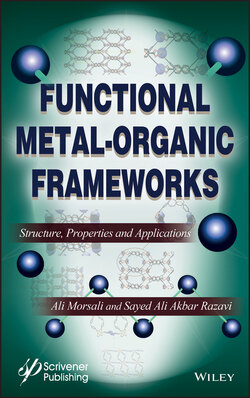Читать книгу Functional Metal-Organic Frameworks - Lida Hashemi, Ali Morsali - Страница 9
Оглавление
Preface
As a subclass of coordination polymers and porous materials, metal– organic frameworks (MOFs) are composed of a dual organic–inorganic structure based on organic (organic linkers) and inorganic (metal ions/clusters) building blocks. In structural view, a unique kind of connection between organic linkers and inorganic nodes leads to construction of a three-dimensional framework with vacant spaces between building blocks. Owing to unlimited possibility in selection of organic ligands and metal ions/clusters, theoretically it is feasible to synthesis an unlimited number of frameworks.
In recent decades, MOFs received lots of attention in the world of material science and chemistry. Such tremendous attention is owing to their unique chemical characters such as hybrid organic–inorganic nature, high porosity and surface area, tunability in chemical functionality, highly ordered and crystalline structure and moderate-to-high chemical and thermal stabilities. Each one of these chemical properties enable MOFs to apply for specific purpose, but the ability to functionalize MOFs is a specific character to improve the capability of MOFs in different field of applications.
There are three ways for functionalization of MOFs including: (I) using functional organic linker, (II) pore functionalization through immobilization of other functional materials and (III) functionalization of inorganic nodes of the framework. Owing to versatile kind of organic functional groups, linker functionalization is recognized as a favorite strategy to tailor the chemical properties and enrich the host-guest chemistry of functional metal–organic frameworks (FMOFs).
In this book, we tried to review the literature to gain deep insight about the effects of linker functionalization on structure and host-guest chemistry of FMOFs. The content of this book is useful for gaining better understanding of the structural and chemical properties of FMOFs. Considering our strategy in this book, we believe that this book is interesting for diverse group of scientists like chemists, material engineers and anyone who is working on supramolecular chemistry of MOFs and designing functional materials.
The authors
October 2020
